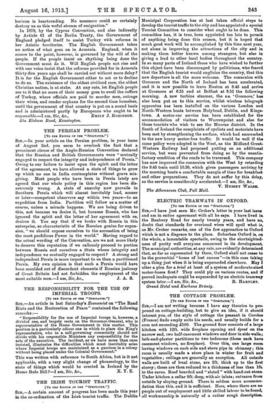THE PERSIAN PROBLEM.
[TO THE EDITOR OF THE " SPECTATOR." I
Sin,—In your article on the Persian problem, in your issue of August 2nd, you seem to overlook the fact that a prominent clause of the Anglo-Russian Convention declared that the Russian and British Governments were "mutually engaged to respect the integrity and independence of Persia." Owing to our failure to insist upon the spirit and the letter of the agreement., we have allowed a state of things to grow up which no one in India contemplates without grave mis- giving. Most people who have been in Persia lately are agreed that our whole policy in this region has been dis- astrously wrong. A state of anarchy now prevails in Southern Persia which will almost inevitably lead, sooner or later—competent observers say within two years—to an expedition from India. Partition will follow as a matter of course, unless a miracle happens. We are being driven to this, not because we desire it, but because Russia, who has ignored the spirit and the letter of her agreement with us, desires it. You say that if we broke with Russia in this enterprise, so characteristic of the Russian genius for expan- sion, " we should expose ourselves to the accusation of being the most perfidious Power in the world." Having regard to the actual wording of the Convention, are we not more likely to deserve this reputation if we callously proceed to portion between Russia and ourselves a State whose integrity and independence we mutually engaged to respect ? A strong and independent Persia is more important to us than a partitioned Persia. My own opinion is that such a Persia would have been moulded out of discordant elements if Russian jealousy of Great Britain had not forbidden the employment of the most suitable men.—I am, Sir, &c., J. A. S.


































 Previous page
Previous page